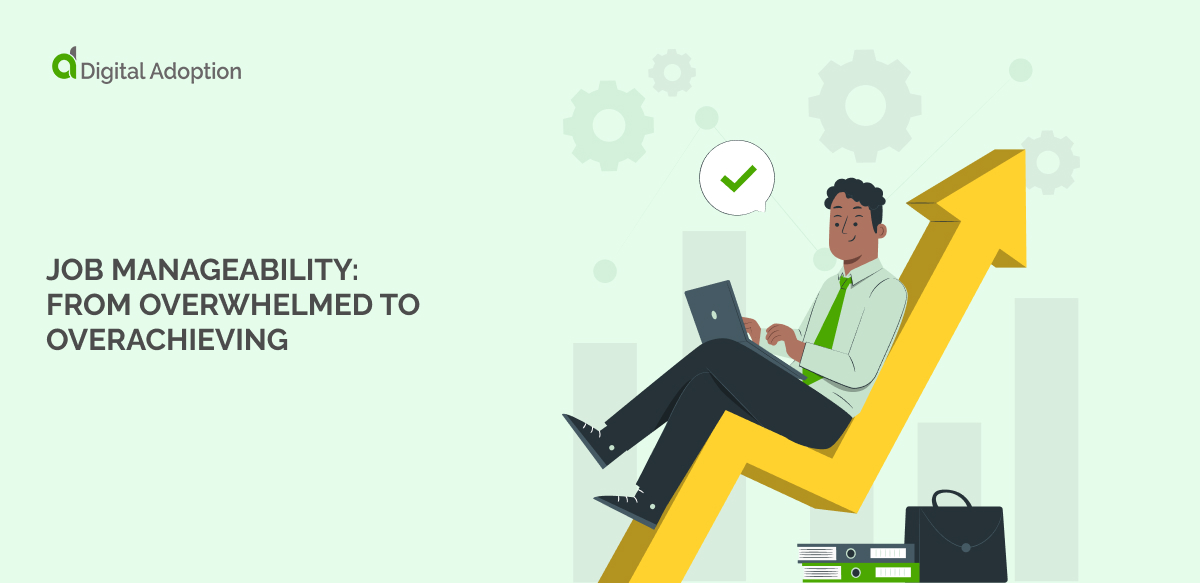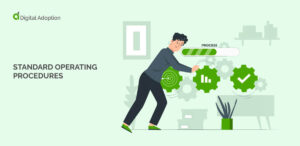You might believe constantly enhancing your skills is the key to becoming an effective manager.
However, recent insights from Gartner suggest otherwise, emphasizing that job manageability might play a more significant role in ensuring your success and that of your team.
Imagine a corporate world where nearly eight out of ten employees expect more support from their managers, whose roles have become increasingly complex and demanding. This isn’t a hypothetical situation— it’s the current state of the workplace as backed by Gartner’s data.
In this article, we’re going to distill the research and insights from Gartner’s reports, and together we’ll reflect on the importance of manageability over skills development and how you can implement strategies to enhance your effectiveness in the ever-evolving corporate environment.
- What is job manageability?
- Understanding job manageability
- The direct benefits of job manageability
- The indirect benefits of job manageability
- The problem with over-emphasizing skill development
- How to integrate job manageability and career planning
- Organizational approaches
- Policy recommendations
- Job manageability: Redesign your role for success
What is job manageability?
Job manageability refers to how manageable a job is, with a particular focus on managerial roles. It relates to how effectively you can conduct your responsibilities with the resources and support available.
Picture yourself juggling—your workload, autonomy, resources, support, and clarity are all in the air. If you’re managing your job well, you’re keeping these elements in motion smoothly, not just in fleeting instances, but as a constant practice.
Understanding job manageability
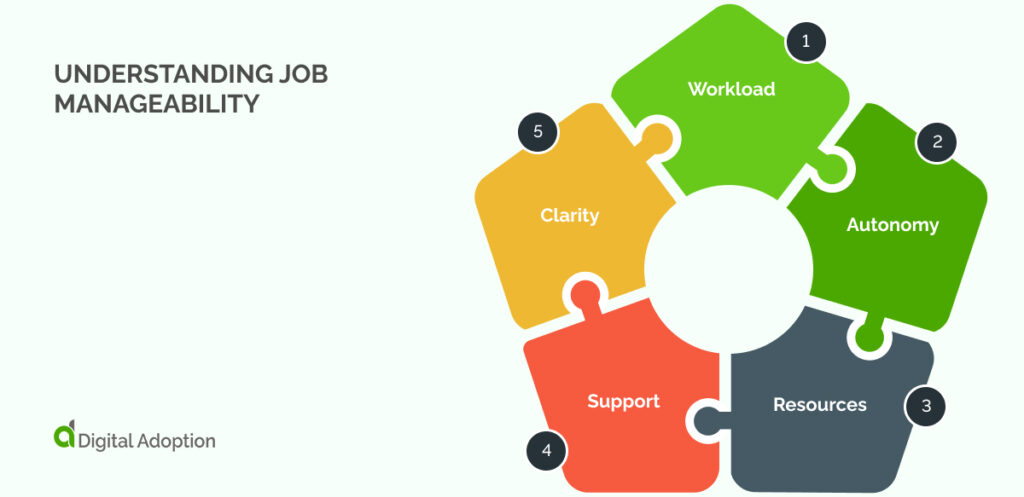
Your effectiveness as a manager is crucial—it ripples through your team, significantly boosting performance, engagement, and well-being.
However, there are many factors that can impact your effectiveness. You are likely spending more time on project management than on leading and developing, with Garnter’s data suggesting nearly half of your peers are reporting the same.
While this issue isn’t new, Gartner’s research reveals a notable correlation: Managers who view their roles as manageable tend to be markedly more effective. To unpack this further, Gartner has highlighted several critical insights:
- Your ability to effectively manage your workload, coupled with organizational support in resetting role expectations and simplifying tasks, can make your job 1.4 times more manageable.
- When you self-discover your fit for your role, your chances of finding your job manageable nearly double.
- Habit-building within your organization can also lead to a significant improvement in job manageability.
So, with these insights in mind, what are the key elements that define job manageability and make a manager’s role not just doable but sustainable for long-term success?
Workload
It’s not merely the volume but the complexity of the tasks that counts.
Manageability means being able to tackle your responsibilities without feeling perpetually on the brink of burnout.
Consider a day packed with meetings that leaves you with no time for reflection or team development— this is a sign your workload might be tipping the scales.
Autonomy
This defines your capacity to make work-related decisions.
When you have the freedom to decide the ‘how’ and ‘when’ of your tasks, your job’s manageability improves.
For example, choosing to delegate tasks to team members to better focus on priority areas where your expertise is crucial demonstrates autonomy.
Resources
Adequate resources mean having access to the right tools and people.
This could look like being equipped with the latest project management software or leading a team that has the necessary skills to fulfill the demands of a project.
Support
Support encompasses the help you receive from your organization, including leadership and HR.
Effective support can manifest as a mentor who helps navigate complex leadership issues or an HR department that resolves team conflicts efficiently.
Clarity
Having a clear understanding of your role and what’s expected of you is essential.
Clarity in expectations and objectives means you’re better equipped to meet and surpass them.
The direct benefits of job manageability
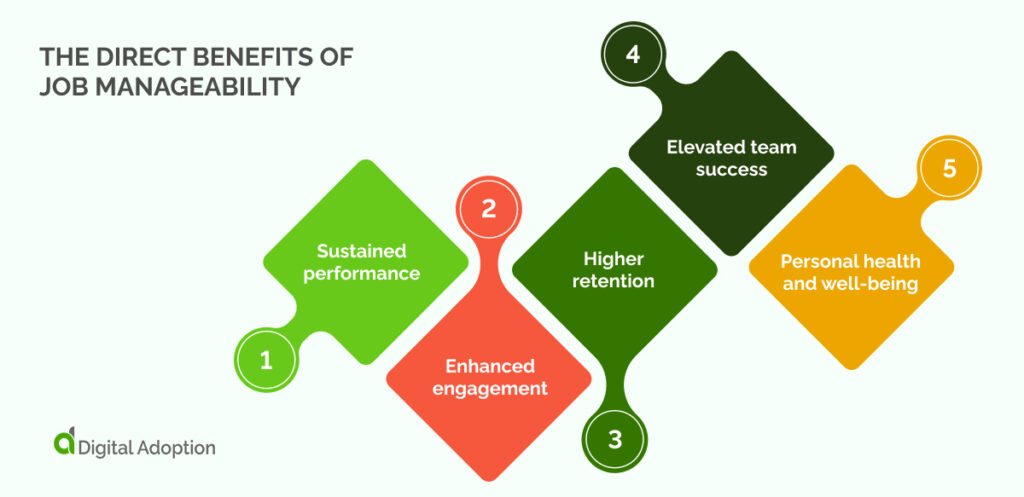
Your well-being thrives when your job is manageable.
Consider this: individuals who report manageable workloads experience a significant 12.5% increase in physical and mental health. This means you’re likely to feel less stressed, be in better health, and maintain a more optimistic outlook on life, which can ripple out to affect all areas of your performance positively.
Manageability plays a crucial role in your work-life balance. With a job that fits within the reasonable confines of your capabilities and time, work doesn’t have to spill into your personal life.
You can wrap up your day with a satisfying sense of completion, knowing that you’ve accomplished what you needed to, and then disconnect to recharge.
Here are five ways job manageability directly enhances your professional life:
- Sustained performance
You’re more likely to maintain high-performance levels without burning out, as a manageable job can mitigate stress even in high-stakes roles.
- Enhanced engagement
With a 13.4% increase in engagement for employees under effective managers, a manageable job can help you stay invested in your tasks and more responsive to your team’s needs.
- Higher retention
Employees with manageable jobs are 3.2 times more likely to intend to stay with their current employer, indicating that manageability can foster loyalty and reduce turnover.
- Elevated team success
With employees 15.4 times more likely to be high performers under effective managers, it’s evident that your ability to manage well translates to your team’s success.
- Personal health and well-being
The 12.5% boost in well-being among employees with manageable jobs shows a clear link between job manageability and personal health.
By prioritizing job manageability, you’re not only setting yourself up for success but also paving the way for a healthier, more engaged, and dedicated team.
The emphasis on manageability transcends mere productivity— it’s about nurturing an environment where you and your team can consistently perform at your best.
The indirect benefits of job manageability
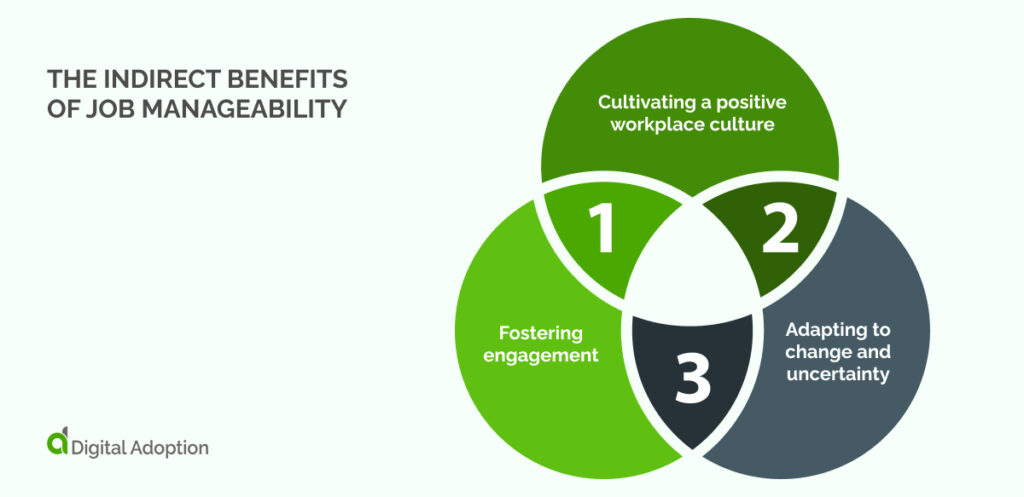
When your job is manageable, it doesn’t just improve your direct output and well-being— it also sets off a chain reaction of positive effects within the workplace.
The reach of manageability extends far into the realms of engagement, workplace culture, and adaptability.
Here are three indirect benefits of job manageability:
- Fostering engagement
Engagement at work often hinges on the feeling that your tasks and responsibilities are within your control.
When you’re not overwhelmed, you can dive deeper into your projects, contributing innovative ideas and demonstrating a greater level of commitment.
This sense of engagement is contagious— when you’re invested, your enthusiasm can motivate your peers, creating a dynamic and collaborative team environment.
- Cultivating a positive workplace culture
Job manageability contributes to a positive workplace culture by building a foundation of trust and support.
A manageable workload implies that your organization values your time and well-being, which can lead to increased job satisfaction and a shared sense of purpose.
In a culture where manageability is the norm, you and your colleagues are more likely to have the energy to support each other, celebrate successes, and work through challenges collaboratively.
- Adapting to change and uncertainty
In an ever-changing work landscape, the ability to adapt is crucial.
A manageable job provides the bandwidth necessary to navigate uncertainty without succumbing to stress.
When you’re not constantly at capacity, you can flexibly shift gears to address new challenges, learn additional skills, or re-prioritize tasks as needed. This resilience is invaluable, both for individual career progression and for the organization’s ability to stay agile in a volatile market.
The problem with over-emphasizing skill development
The current trend in many organizations is an overemphasis on constant upskilling.
While staying current is undoubtedly important, an overzealous focus on learning new skills without addressing manageability can lead to burnout and diminished returns.
Skills are not developed in a vacuum; they need an environment where they can be nurtured and applied. Without manageability, even the most well-intentioned upskilling initiatives can backfire, leading to frustration and a sense that the time and resources invested in learning are wasted.
A more sustainable approach recognizes that skill development and job manageability are interdependent.
By fostering a manageable workload, organizations not only enhance the well-being of their employees but also set the stage for continuous, effective professional development.
Manageability creates an environment where learning is integrated with doing, where employees can experiment with new methods, and where innovation is born from the ability to apply skills in a thoughtful, impactful manner.
How to integrate job manageability and career planning
Understanding and integrating job manageability into your plans can serve as a significant driver for both satisfaction and success as you navigate your career path.
Here are ten strategies and approaches that you, and the organizations you are part of, can employ to enhance job manageability.
Individual strategies for manageability
- Assess your workload: Regularly evaluate your tasks and responsibilities. Are they reasonable? Do you have the necessary resources? If not, it might be time to speak with your manager about realigning expectations or securing additional support.
- Seek autonomy: Advocate for autonomy in your role where possible. Autonomy can empower you to work in ways that suit your strengths and can make your job feel more manageable.
- Build a support network: Cultivate relationships with colleagues and mentors who can provide guidance and assistance. A strong support network can ease the burden during challenging periods.
- Develop clear role clarity: Work with your leadership to establish clear expectations for your role. Role clarity can eliminate uncertainty, allowing you to focus on your tasks with confidence.
Organizational approaches
- Reset role expectations: Organizations should continuously reassess the scope of managerial roles to ensure they are realistic and aligned with individual capabilities.
- Simplify managerial tasks: Introduce tools and processes that simplify managerial responsibilities. This can reduce the “work about work” that often burdens managers.
- Invest in development programs: Tailor manager development programs to focus on practical skills that enhance manageability, such as delegation, prioritization, and stress management.
Policy recommendations
- Industry standards for manageability: Industry leaders can create standards and benchmarks for job manageability, helping organizations to understand and measure how well they are doing.
- Government role in workforce well-being: Policymakers can incentivize companies to prioritize job manageability through legislation or tax benefits. This could encourage investment in training programs and the development of more manageable job designs.
- Promote transparency and accountability: Encourage organizations to be transparent about their efforts to improve job manageability and hold them accountable for their progress.
Job manageability: Redesign your role for success
In summing up our exploration of Gartner’s research on job manageability, we’ve underscored its pivotal role in shaping sustainable career trajectories.
We’ve seen that manageability is a substantial factor that enhances work-life balance, fosters engagement, and sustains high performance.
It’s clear from the data that while skills development remains important, the capacity to effectively manage one’s job is five times more influential in improving managerial effectiveness.
You’ve been equipped with the knowledge that job manageability extends far beyond the simplicity of tasks— it encompasses workload, autonomy, resource availability, support, and clarity. And you’ve discovered that when these components are in alignment, the ripple effects are profound, leading to better job performance, greater employee satisfaction, and a stronger, more resilient organizational culture.
For individuals, it’s crucial to recognize the power you hold to shape your job’s manageability.
Engage in open dialogues with your leaders, assess your role regularly, and be proactive in seeking the support you need.
For leaders and HR professionals, the challenge is to pivot focus from constantly pushing skills development to fostering an environment where job manageability is a central concern.
This can be achieved through resetting role expectations, simplifying tasks, and investing in development programs that promote practical, manageable skills.
And finally, for policymakers, it’s essential to step up and play a part in promoting job manageability. By creating incentives for businesses, setting industry standards, and ensuring that the workforce’s well-being is a priority, you can effect meaningful change.
It’s time to move forward with the understanding that our ability to manage our jobs effectively is a cornerstone of thriving organizations and economies.

